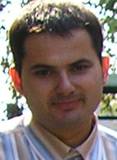Support member
nvestigation of molybdate and borate glasses and glass-ceramics materials
名前と所属

教育研究高度化支援員:Lyubomir Ivov Alexandrov(リュボミール イボフ アレクサンドロフ) 略歴:
1998-2002 Bachelor degree -University of Chemical Technology and Metallurgy
-Sofia- Faculty of Metallurgy and Material Sciences
(Plastic deformation and thermal treatment)
2002-2004 Master degree -University of Chemical Technology and Metallurgy
-Sofia- Technology of materials
2005-2009 PhD degree - Institute of General and Inorganic Chemistry,
Bulgarian Academy of Sciences
研究内容
The molybdates and borates are very attractive materials in several fields because of their wide variety of important physical properties, including ionic and electronic conductivity, ferroelectricity, magnetic properties, non-linear optical properties, catalytic activity.
I work in the field of molybdate systems which containing rare earth metal oxides. My objects are systems (La2O3-MoO3, Nd2O3-MoO3, La2O3-MoO3-MgO, Nd2O3-MoO3-MgO, Nd2O3-La2O3-MgO, and La2O3-MoO3-B2O3). In these systems I study the glass formation region, liquid phase separation, structure of glasses and obtaining glass-ceramic and crystal phases (La2Mo2O9, LaMoBO6, and La2Mo3O12).
It was established that the increase in MoO3 content, at the expense of B2O3, with constant Ln2O3 decreases the thermal stability of the glasses, and the crystallization temperature, Tx, shifts to low temperatures in the glasses containing above 25 mol. %.Tx increases up to 560-800°C.
It was proven the existence MoO6 units, MoO4 isolated units and the transformation of BO3 to BO4 units in the structure of the glasses. By XAFS spectra we determined the Mo-O distance in the first coordination shell is at 1.75 Å. The coordination number against the oxygen varies between 6 and 5 depending on the composition. The La-O distance is in the range 2.47 Å and 2.55 Å. The average coordination number of La is 7. The distances Nd-O are longer, 2.73 Å, and the coordination number is near 7.
Main tasks for my post?doc position in Japan:
1. Synthesizes of some glasses from La2O3-MoO3-B2O3, Nd2O3-MoO3-B2O3 and ZnO-MoO3-B2O3 systems.
2. I will try to crystallise same glasses by conventional and non traditional methods of crystallisation and receive some information about the structure of delivered materials.
3. To determine the particle size of crystallites precipitated in the amorphous matrix.
4. Determined optical properties of the glasses, glass-ceramic and ceramic material from the same systems.
5. Laser pattering of rare-earth molybdate crystal an glasses.
